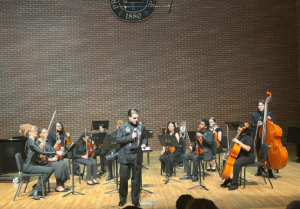Rush: What’s all the Hullaballoo About?

October 16, 2012
It’s October, so you probably know what that means. It’s time for Greek rush or, as it’s called now, recruitment. Yet, across campus, there is this air of mystery about what the faculty feel about recruitment.
There has been a lot of controversy surrounding the placement of recruitment with the faculty. This has sometimes been interpreted by the campus community as anti-rush; however, this is actually not the case. The faculty, as a whole, support or at least understand the validity of Greek fraternities and sororities; the problem they have is with the placement of recruitment.
Dr. Hobbie and Dr. Beasley are two of the professors that are huge proponents of having Spring recruitment. Dr. Beasley argues that spring recruitment not only improves retention efforts but it also gives Greek organizations an accurate estimate of a potential new member’s grade point average. All fraternities and sororities have a GPA minimum, so having a semester to gauge the potential new member’s eligibility academically could be a helpful innovation.
Dr. Hobbie believes that having recruitment in the fall disrupts unity among the freshman class. Having a semester together will unite the class more and potentially help with retention–that is maintaining student population. If someone does not get a bid to their sorority or fraternity of choice, that person has already had a semester to form friendships around campus. He also mentioned that at schools like Davidson, who have recruitment in the spring, the memberships have increased for Greek organizations—men and women are more comfortable and, therefore, are more willing to rush.
Dr. Rebecca Davis points out that since recruitment is a solid two-week period (one week for men and another for women), academics get placed on hold. Students do not do their work, and if they come to class, they are “tired, weepy, and possibly hung-over.” Even though the events are alcohol free, the voting that takes place after is not necessarily. Therefore, Dr. Davis says that, to the faculty, it is not about the overall GPA of students; it is about the two-week period interruption in academics.
Dr. Davis mentioned that some of the faculty are proponents of having recruitment before students get back from Christmas break. That is before classes start, effectively preventing any class interruption from occurring. Dr. Davis, herself, is a proponent of having recruitment during the first four weeks of school. This is a less hectic time frame in the academic calendar because it is not at the time of midterms.
A member of a fraternity, who wished to remain unnamed, commented that having rush in the spring semester is much more expensive for the fraternities. They spend a lot of money to throw parties in the fall semester to impress the potential new members. Moreover, he was concerned that having rush in the spring would actually hinder retention because rushing is a “forced socialization process” that forces men to become involved and gets them out of their shells.
Linda Jameison, Interim Dean of Students and Campus Life, believes that earlier recruitment is ideal. It not only is easier on the sororities and fraternities, it is also more fair to the potential new members. All of the other registered student organizations (RSO’s) openly recruit from the very beginning of the year. The only RSO’s that cannot allow new members to join from the start are the Greek organizations.
Ms. Jameison believes that the majority of students who plan to rush have made up their minds before college and therefore have already decided to affiliate themselves with the Greek community. Sororities and fraternities both have informal rush all year—also known as snap bids which are bids given out to students at any point in the year to join that particular sorority or fraternity—so there are always opportunities to join a Greek organization later in the year.

There have been many strides towards Greek unity and reformation of recruitment. There are now Grand Chapters once a month where all the sororities and fraternities get together and meet as one entity. Panhellenic (the national board of sororities) and IFC (Interfraternity Council) have made several changes to the recruitment process and weekend policies.
A couple of concerns that faculty have in regards to recruitment are student safety and emotional well-being. These concerns have been addressed in the new format. For instance, for sorority recruitment, the Pi Chis (women disaffiliated from sororities to advise potential new members) are much more active this year in helping potential new members through the process by meeting with them regularly and checking up on them. With fraternities, the pledgeship has been decreased to six weeks and there are now rules against hazing the pledges.
It is surprising how many points of views there are about recruitment. They are all valid and well-reasoned points. It will be interesting to see the results of the faculty vote.





